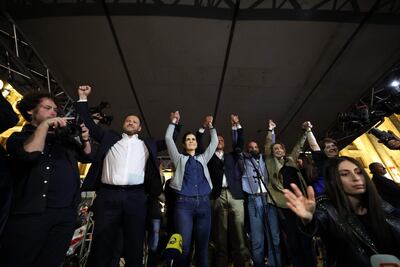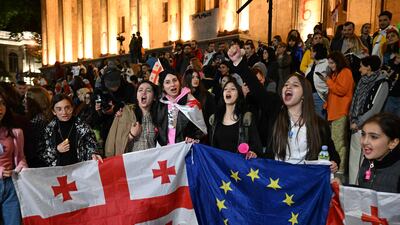Many, if not most, countries adhere to the principle of non-interference in others’ internal affairs. China and Russia stressed this in their recent joint statement. It is one of the six “fundamental principles” of the Association of South-East Asian Nations, it has traditionally been the policy of the Arab League, and it was “reaffirmed” as a principle by the foreign ministers of the G77 group at a meeting at the UN in 2022.
Western countries such as the US and the UK don’t use the exact same words – it would be hard for them to do so after their history of disastrous interventions, Iraq and Libya in particular – but they don’t like outsiders interfering in their domestic discussions either. Witness the outrage after then president Barack Obama intervened in the debate over Brexit by saying in 2016 that the UK would be at “the back of the queue” for a trade deal with the US should Britain leave the EU. The previous year, the Democratic Party was in a ferment when Israeli Prime Minister Benjamin Netanyahu gave a speech to the US Congress in which he criticised the Obama administration’s approach to Iran.
This very weekend, the government of Spain reacted with fury when Argentine President Javier Milei attacked Prime Minister Pedro Sanchez and his wife at a far-right rally in Madrid. The Minister of Foreign Affairs, Jose Manuel Albares, stated that Mr Milei had broken with all diplomatic customs. “Mutual respect and non-interference is an unbreakable principle of democracy,” he said.
So this makes it all the more astonishing that the foreign ministers of Latvia, Estonia, Iceland and Lithuania turned up in Tbilisi last week and not only took part in a protest rally against Georgia’s democratically elected government, but three of them sat on the rostrum in the front of the crowd as well. Far from batting an eyelid, a host of western leaders joined in the criticism of the Georgian government.

Quite apart from being extraordinarily rude and undiplomatic, this was a blatant expression of interference in Georgia’s internal affairs. Can one possibly imagine Russian Foreign Minister Sergey Lavrov attending a march against US President Joe Biden in Washington, or an Indonesian foreign minister protesting against the government of a neighbouring country in its capital? It’s unthinkable. Yet these European ministers had no qualms about this display of the utmost disrespect towards the Georgian Dream coalition government, which since 2012 has won every general election – in polls that US-based Freedom House describes as “regular and competitive”.
What they are objecting to is a recently passed bill that they claim could stand in the way of Georgia’s eventual accession to the EU. The law stipulates that NGOs and independent media that get more than 20 per cent of their funding from foreign sources would have to register as “organisations serving the interests of a foreign power”. (The bill has been vetoed by President Salome Zourabichvili but is expected to pass again and become law.) Now 20 per cent is a considerable proportion, and one would have thought it would be easy for groups wishing to avoid this label to shave a bit off the outsider funding, and make do with 19 per cent, perhaps. But the fact that there is such an outcry suggests that many of these NGOs feel they can’t survive without the foreign funding.
And why would any country find that acceptable? Shouldn’t civil society groups be organic, and spring from the country they are in? If ordinary Georgians aren’t supporting these NGOs, or not enough to keep them going, are they genuine expressions of what Georgians actually want? Why are they so necessary? Shouldn’t the laws of the market apply to them too – if they can’t sustain themselves, they go bust. I’d go so far as to say that any NGO with a domestic political agenda should be banned from receiving any foreign funding at all, because it’s not for foreigners to meddle in a country’s internal politics – that is the principle of non-interference. This is a view held widely around the world, certainly in Malaysia, where I live, and where accusations of foreign funding are hugely damaging and always hastily denied.
The Speaker of Georgia’s Parliament, Shalva Papuashvili, has explained on social media the rational for the legislation, and denies it is meant to copy a Russian law that some have interpreted as an attempt to shut down internal opposition. “Georgia has to deal with dramatic foreign challenges mostly on its own,” he wrote.

“One of these challenges is unaccountable foreign money, which freely flows into Georgia’s political system, including the radical groups. The new legislation on transparency of foreign influence is to deal with this challenge. The legislation has precedents in the West, is constitutional, proportional, and within the limits of democratic governance. Simply calling this law ‘Russian’ does not make it undemocratic, and, moreover, does not justify attacks on the Georgian government.”
There are indeed precedents in the West. Britain recently introduced the Foreign Influence Registration Scheme, to enable “transparency of foreign influence in UK politics”. In the US, under the Foreign Agents Registration Act the former senator Bob Dole has had to register as a “foreign agent” for his work for other countries. It sounds a little sinister, and also a bit demeaning for a man who stood for both the presidency and the vice presidency for the Republican Party. But that’s the law.
We don’t have the figures to hand. But it is a reasonable assumption that the Georgian NGOs that western and EU leaders are so worried about are receiving their foreign funding from, mainly, the US and the EU. And what the latter are saying is that when they are pushing their agenda, it should not have to be declared – presumably because their agenda is self-evidently “good”. (Naturally the same would not apply to China or Russia.) Accountability is apparently not necessary in their case.
So the story is completely back to front. I don’t believe that US and EU leaders are defending the path to European integration in Georgia – for since when has that involved the right to receive unlimited, undisclosed foreign funding? Neither is it about democracy; there is a general election due in October, and if voters don’t like this law they can kick the government out.
I think the truth is that the EU and western organisations and individuals are demanding they have the right to interfere in Georgian politics – because that’s what this is – without ordinary Georgians knowing about it.
And if that’s an expression of “European values”, I’ll take “Asian values” instead any day of the week.


